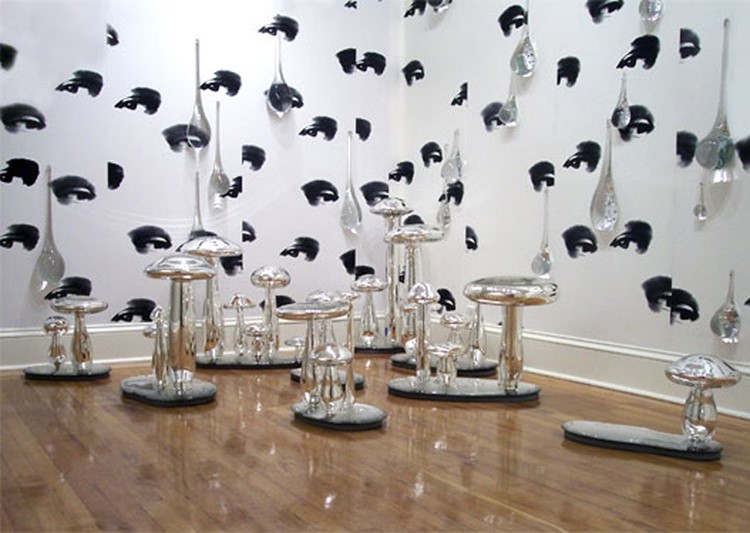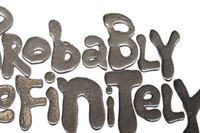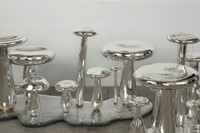Taken with artist Rob Wynne’s glass works, the novelist AM Homes wrote this short story as a fictionalised interpretation his work. The tale, Tears of Glass, inspired by Wynne’s Teardrops – oversized glass globules, attached to the interior side of
Earlier this year, artist Rob Wynne exhibited at the Gavlak Gallery in Florida as part of the Think Pink show, which looked at artists’ use of the colour pink and how it takes on meaning in photography, sculpture and mixed media.
Taken with Wynne’s glass compositions, which include short, glib phrases, the novelist AM Homes wrote this short story as a fictionalised interpretation his work.
The tale, Tears of Glass, inspired by Wynne’s piece Teardrops – oversized glass globules, attached to the interior side of a wall as if stalled in their falling motion – concerns Julien, an extremely rich man who is learning to paint. Confronted with his nude model, Peter, who like Wynne also writes glass text, their witty exchanges recall – and in places literally repeat – the absurdist colloquialisms that Wynne deals in.
“It’s a sad story, often funny, or it’s a funny story sometimes sad,” Peter says. “I guess it’s all about how you see it.”
“Or how you don’t,” Julien says, pouring the coffee. “Like magic.”
“Exactly,” Peter says.
“So, exactly what is it?” Julien says. “Remind me.”
“I was born in Iowa,” Peter begins, “delivered in a barn. My mother thought she had plenty of time, so she went out to milk the cows (‘Can’t leave the cows full’). And then I came; Pierrot Lunaire, a bit much for a farm boy, don’t you think? My father said I was named from a painting; my mother said from a piece of music. ‘Peter Looney, Looney Peter’ is what kids called me, and I must admit, I always had the feeling of being on the outside. ‘We’re all from the outside,’ my father said, talking me down from the hayloft where I’d hide. He tried to be comforting; he’d come to Iowa from California in a wave of reverse migration. He liked to tell people he hailed from the Boulevard of Broken Dreams, and folks often asked him if that was the name of a real street. My mother, she came from Duluth.”
“Milk?” Julien asks, raising the pitcher.
“No thanks, I don’t do dairy.”
“And where do you live now?”
“In a world that is and never was,” Peter says, sipping his coffee. They are taking a short break from a session. Julien has been learning to paint and Peter is his subject. Peter, too polite to say anything, feels Julien’s less learning to paint than learning to stare.
“Is it hard for you to have a coffee and converse while naked?”
“It’s not hard for me if it’s not hard for you,” Peter says.
“And Paris?” Julien says, changing the subject.
“Well, some say Paris was a woman; for me it was more a dream. Where else could someone like me go, a circus clown, a dancer with a missing hand?”
“Remind me about the hand? I assumed war,” Julien says.
“Farm accident,” Peter says. “Right hand and left big toe.”
“That would seem difficult, they’re so far apart, hand and toe.”
I lost one trying to free the other,” Peter says.
“And how did you become a life model?”
“Unabating hunger,” Peter says.
“You appear to be doing well.”
Peter smiles, revealing a set of silver teeth. “I’m mercurial, like a chameleon or a chimera. I am this and I am that, more than one thing at the same time. I am an evolutionary artist, I weave my own fabric.”
“Enough about you,” Julien says, abruptly. “Let’s talk about why you’re here. After all I brought you here for a reason.”
“You said you wanted to draw me.”
“I was lying. I was thinking of something else.”
“What?” Peter asks.
“You have no idea?” Julien teases. “As a man who can afford anything, it is my prerogative to be outrageous. Have you met my wives – first, second, and third? Two and three are half-sisters.” Three women come into the room.
“I’d shake your hands but… ,” Peter says raising his handless limb to the women.
“I am a man of appetites,” Julien says. “The first one, she has the appetite of a bird, a carnivore.”
“Entertain us, harlequin,” one of the wives says. (1)
“I like your shirt,” says another, reaching out to touch.
“It’s not a shirt, but my skin, a tattoo of many colors. When I put on my shirt, it looks like I’ve got a cravat at my neck.”
“It’s a bird nest,” one wife says.
“You mean bee’s nest,” says another.
“Are you saying, he’s the bees’ knees?” offers the third.
“It’s all a hive, a web, a weave,” says the first, clarifying on behalf of one and two.
“I’m just a fly on the wall in this scene,” Peter says, to no one in particular.
“Is that you in that picture?” One asks.
“I am what he’s painting,” Peter says.
“Do you feel you are being watched?” asks a wife.
A spider crawls up Peter’s arm, he sees it dancing on his tattoo.
“It’s Oliver,” the second wife says, “The children’s pet. We’ve been looking for him everywhere.” She slaps an empty teacup onto Peter’s arm, catching the spider. “Do you have a fear of spiders?”
“I fear nothing except life itself,” Peter says. “I notice your hands are chapped,” he whispers privately to one of the wives.
“I can’t stop washing them or staring at people’s private parts. I look at someone and then I have to wash my hands,” she confesses.
“What about your eyes, why not use eye drops?” Peter suggests. “Wash your eyes, it’s closer to the source, and leave your hands alone.”
“I never thought of that,” she says. “I’ll look into it.”
“Going back to what you said,” says the second wife. “You refer to yourself as an evolutionary artist. Were you a spin-off or spin-out of the baroque conceptual period —popularly called ‘If You Build It They Will Come,’ referencing both the Egyptian pyramids, the Seven Wonders of the World, and the film Close Encounters of the Third Kind, also known as the ‘If You Don’t See It – It Doesn’t Mean It’s Not Here’, or ‘You Break It, You Bought It’, an essay in three volumes by noted painter/historian Rochelle Ross née Schwartzman?”
“You know Rochelle!” Peter exclaims happily.
“She was my roommate in college,” the second wife says. I came to Paris for junior year, lost my passport on the Bateaux Mouches and never went home again. I’m the second wife, but Julien is my third husband.”
“I thought you were French,” Peter says. “You seem so French, this husband and all the wives.”
“Born in Brandywine, Pa. But I am French now,” she says. “It’s nice, saves on plastic surgery. The French age naturally.”
“I’m Skittish,” the third wife offers. “Scottish, Irish, English.”
In the background there is music playing – Sting, singing Roxanne. (2)
“He tells me that you are not just an artist, a dancer, and a sit down comedienne, but that you are a poet?” the second wife says.
“I write in glass,” Peter says. “‘Don’t break my words,’ I tell my editors. My best works are fragments that linger, splinters that lodge and can’t be forgotten. Silvered glass. Several years ago, in Marseilles, I found a photograph of an amateur in tights, a sort of traveling troubadour/actor upon which I embroidered DISREGARD.”
“And then what happened?” a wife asks.
“It was promptly forgotten. And once, when I was living upstate, I found at the bottom of my bag a love letter from thirty-five years ago.”
‘You are too young to have anything from thirty-five years ago,” another wife says.
“And you are too kind,” Peter says. “And then there was the post card mailed in 1911: ‘Will try to come Tuesday don’t know yet for sure, Mama is lame, she fell out the barn door.’”
The second wife continues, “There is, to what you are saying, an overall sense of awe, which was one of the goals in Baroque art. (3) The history of the world is really the history of art – in fact they should stop teaching from textbooks, and teach only through painting and sculpture.”
“There is much ‘they’ could do,” Julien says. “They could figure out how a man deals with so many wives, so many lives, so little time, so much to do, and so on it goes ad infinitum to eternity.”
“Here, here,” the third, and Peter assumes current, wife says.
“Where?” the others ask.
“As if there was ever to be a world better than this, as if there was ever to be a better world,” Peter repeats to himself like a nervous habit, like fingers working a rosary.
“Tears of Glass,” the first wife says. “That was always one of my favorite books by Sylvia Whitman. “Here I sit, singing the song of myself.” (4)
“If the body were not the soul, what is the soul?”
“What is the soul,” they chorus.
Peter, with his slowly fading smile, is a confused actor who appears to have forgotten his lines; he is a twisted sugarplum of a man. He sits bewildered, flattered by all the attention, longing for something seen long ago, something not forgotten, “What exactly was it that I was about to say?” Peter asks.
“What was it?” Julien wants to know.
“It’s not how much you have, but where you hold it in your heart,” the second wife says. “But I bet Rochelle would argue that with me, she’d say, ‘You know what they say, in the end the one with the most toys wins.’”
“She’s a collector,” Peter says.
“I can see her there still, on my rug,” Julien says.
“The fly upon the wall, seeing all, grows large, such a know it all,” the first wife says.
Peter looks at the painting, at the work done so far. “Can you make me a copy? Can you blow me up big?”
“So are we, or are we not going to have a cuddle?” the third wife wants to know.
Peter rises from the cold toadstool where he’s been sitting. He stands – revealing himself. (5)
“I feel the heartbeat of a bird,” the first wife says, looking at him.
“That’s the sound of butterfly wings,” Peter says.
“A beautiful sound alone is not enough,” Julien says quoting Maria Callas, while putting a few finishing brush strokes on his work.
There is the sound of ice cracking, they all brace themselves. They close their eyes and stand without moving. Time passes.
“Believe in me and I’m yours,” the second wife says to Peter.
“I’m sorry,” Peter says gathering his clothes.
“Are you?” she asks.
“Probably, definitely,” Peter says. “I must go.”
“Have we really finished?” Julien asks.
Peter laughs, “It is only at the end that you wish it would go on forever. After all, this is a world that is and never was.” (6)
(1) Harlequin or Harley Queen, leader of la maisnie Hellequin, the troop of demons riding the night air on horses. “Herla," a mythical character likely the same as the "Elf King" of the Goethe poem. Sometimes also associated, a mute character carrying a magic wand, or the stock characters of commedia dell'arte. A wild and crazy dresser, a fob or dandy, wearing frocks that are "particoloured."
(2) Early versions of the song Roxanne by the Police were actually called “Watteau”, and the song was not based on a prostitute in Paris as noted on Wikipedia, but direct observations of the mating habits of a family dog belonging to the former school teacher, Gordon Matthew Thomas Sumner, who it turns out is not a natural blonde — ie did you notice his brown hair and beard during Barack Obama’s inaugural festivities?
(3) “Tears of Glass” by Sylvia Whitman is a conflation of Song of Myself from Leaves of Grass by Walt Whitman, and a play on Sylvia Whitman, delightful daughter of George Whitman, the current owner of the Shakespeare and Company bookstore in Paris, France, who named Sylvia after Sylvia Beach, the bookstore’s founder.
(4) In the arts, the Baroque period started roughly at the beginning of the 17th century in Rome, and was defined by drama and grandeur in sculpture, painting, literature, dance, and music. Several artists of this period were re-born in post-war America and became known as a group affectionately called “Those Who Must Have It All”, or “Them, for Whom Nothing Is Enough.” Their debut group show, The Sky Is The Limit, involved aeroplanes sky-writing lines written by their artist, mentor and godfather Rob Wynne over the following cities: Los Angeles, New York, Berlin, Paris, Zurich, London (flight cancelled due to fog), and, inexplicably, the City of Iowa, Iowa.
(5) The mushroom Amanita muscaria is your basic red mushroom with white spots. The word "toadstool" was often, but not exclusively, applied to poisonous mushrooms, taken from the German "todesstuhl" which translates to "death's stool."
(6) “I am and remain a child; it’s the only way to live,” Mr Wynne has declared publicly time and time again when asked about what he is working on and what comes next. “How else could I do what I do? How could I function if not as a child?” he asks the reporter.



